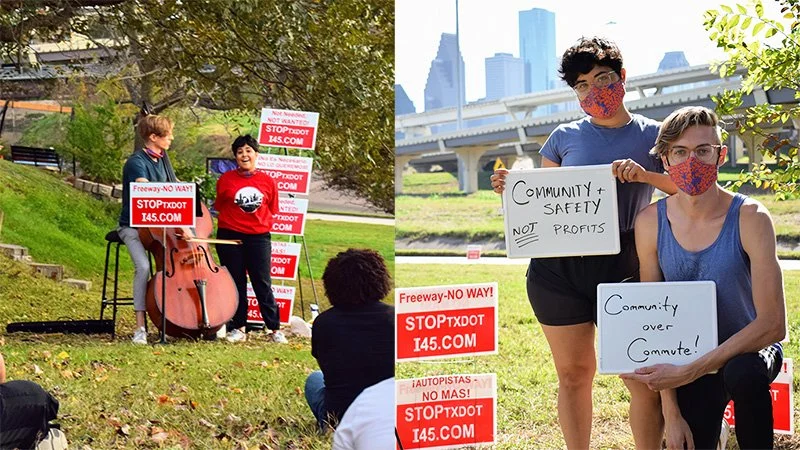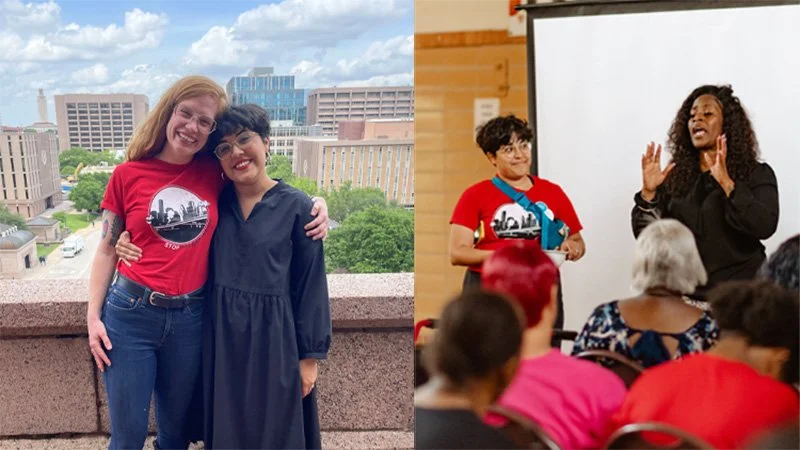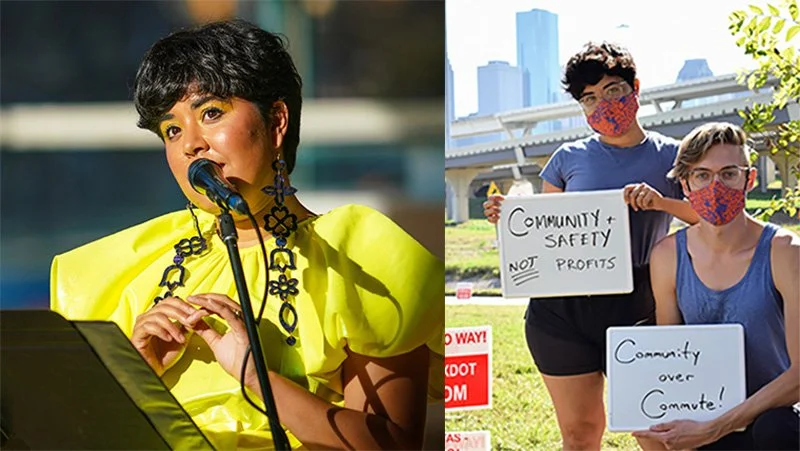On March 10, 2020, Ally Smither landed in California after a long flight, eager to spend the next few weeks singing in San Francisco. But the moment she landed, she learned that wouldn’t be happening. The performance was canceled. As was the rest of the season. In fact, within a week, Smither saw an entire year of work engagements vanish through a combination of emails, calls and texts. COVID-19 had arrived, and her career as an opera singer would never look the same.
With no reason to remain in California, Smither had two places she could go: Houston or New York. New York was on the table as the city where she had just started a postgraduate degree program. Houston, however, was familiar. It’s where she earned her master's and where her husband resided. She also loved Houston. In some ways, it was a no-brainer; but at the time, the Texas city wasn’t part of her long-term plans. In fact, the plan was for her husband to join her in New York, a city that’s an inevitable stopping point for any professional musician.

Those who recognize Smither’s name from Strong Towns’ reporting on Stop TxDOT I-45 — the grassroots group combating the North Houston Highway Improvement Project (NHHIP) — know where she landed.
For those who don’t, Smither ended up doing communications for Stop TxDOT, which meant anything from answering emails — like those from me — to drafting and promoting press releases and managing social media. She assumed the role in December of 2020 having never done anything like it. She even joked that she couldn’t spell "TxDOT" at the time.
“I was so far removed from the world of organizing,” Smither told me. As an opera singer, she’d long been a champion of programming underrepresented composers in recitals and other performance opportunities. Themes of social justice and equity were core to her philosophy as a musician, and she’d done a bit of organizing at Rice University. “But this was totally new to me.”
How she even ended up with Stop TxDOT was a matter of luck. In June 2020, she and her husband volunteered to drive detained demonstrators home as thousands flooded the streets to protest police brutality. In doing so, they connected with West Street Recovery, who suggested they attend an upcoming picnic. That picnic was hosted by Stop TxDOT.
It was then that she first learned about the NHHIP, its $9 billion price tag, and the hundreds of businesses and homes slated for destruction, all in an attempt to alleviate congestion. With Houston already home to the 26-lane Katy Freeway — one of the world’s widest highways and the poster child of induced demand — it was hard to imagine anybody would be championing more lanes. Yet, here was the NHHIP.
It was easy to see why the project should be opposed. What Smither didn’t anticipate at the time, however, was that she would be so moved by the sociopolitics of transportation and infrastructure. She was seeing in real time how much of what she cared about — like accessibility, dignity, and racial and economic inequities — was materially impacted by the choices in our built environment.
So, she attended Stop TxDOT’s next meeting. “I had no technical background in transportation and I had never organized in this capacity,” she told me. “But in being a musician, I’ve organized concerts, I ran an ensemble … I had a lot of skills already that were actually very well suited to this kind of work; you know, people-moving skills.”
Her proposal to put on concerts as a means of spreading awareness of the project and mobilizing the public received a thumbs-up. “That ended up being my first experience with Stop [TxDOT].”

Let It Unfold
Soon after, Stop TxDOT’s founder Susan Graham was soliciting help with social media. Smither stepped up, having never worked in that capacity but figuring she’d learn on the job. She did. In a few weeks, she was issuing press releases and managing Stop TxDOT’s communications. She even enjoyed it. “I wouldn’t say I was good at it yet, but I remember feeling like I have an aptitude for this work. And I enjoy doing it,” she said. “But that was scary.”
Smither had spent practically her entire life training to be an opera singer. She’d been competing professionally since the age of 14, touring the country, singing with orchestras, opera houses and chamber ensembles. COVID-19 disrupted her trajectory, but eventually, theaters would reopen and audiences return. What would this newfound fulfillment in advocacy and this aptitude for communications mean for the life she’d been building all these years?
“Being a singer was my whole world. Before this, I didn’t know many people who weren’t in music,” she told me. "It was very scary to see I had a deep interest and calling to something else. I wanted to be good at it... to do good for it… and for the movement."
In 2021, an opportunity to work full-time as a communications coordinator for a separate Houston non-profit opened up. By this point, the expiration date of pandemic unemployment assistance was in sight, vaccinations were underway, and businesses had adapted to public safety regulations. Normalcy was still far away, but the horizon was visible. Yet, uncertainty persisted in the music industry. Smither knew that in taking the position, she’d not only have job security, but she’d formally develop the skills needed to elevate Stop TxDOT’s messaging, too. At the same time, it felt like closing the door on a life she’d been building for as long as she could remember.
She took the job, heeding the wisdom of author Adrian Marie Brown: “Take the next step that’s aligned with your values, and let it unfold.”
If You Want a Movement, You Have To Let People In
In 2024, Smither continues to live by those words. She is still an opera singer, balancing her career with her organizing and communications work. In addition to Stop TxDOT I-45, she works part-time for the Houston Air Alliance, a longtime ally of Stop TxDOT.
“[Since joining Stop TxDOT] I’ve learned so much and thrown myself at so many things I never thought I’d know how to do,” she shared. Since joining, she’s helped run a political campaign for her best friend Molly Cook, a first-time candidate who snagged 42% of ballot initiative votes against an incumbent to reform Houston's metropolitan planning organization. Just a few days ago, on May 5, 2024, Cook won a seat in the Texas Senate. And with Stop TxDOT, she’s saved one of the few transit-oriented buildings in Houston’s downtown from being entirely demolished for the NHHIP. “And that’s because I crossed paths with Stop TxDOT.”

Smither's life is no longer a choice between music and advocacy; in fact, she’s been able to tease out the symbiotic relationship between the two.
“I have two lives. It’s difficult, but I love my work; I feel very fulfilled ... like I'm grounded in a community,” she described. “The more I do this work [advocacy] the more I love music, art, and singing. And I see so clearly that everybody should have ... the time and mental capacity to fit art and music into their lives. But that requires us fighting for it, including stopping freeway expansions that kill people.”
The balance she’s struck is heartwarming, but it’s only part of Smither's story. She underscores that she would not be where she is today without others affording her patience and trust. “Honestly, a year ago, I was doing all of this stuff and I was only learning then what a planner even did,” she laughed.
Stop TxDOT knew that a successful movement had to be more than its spokespeople, bylines and experts. “It’s horizontal, you know,” she said of how the group operates. There was a willingness to hear and entertain anyone’s ideas, no matter how new they were to the cause. That openness allowed Smither to ask questions, take risks, make mistakes and, above all, learn. And ever since she became someone who welcomes others into the movement, she’s made sure to lead with the patience and trust that welcomed her. “One of the things I’m proudest of is that Stop now has a communications team of about five young women. We’re all teaching each other and learning together constantly, and that is very powerful.”

“We are an ecosystem,” she added. “If you’re more knowledgeable, you need to share and teach and help people grow, whether or not they have traditional credentials. Like, I’m an opera singer, and three and a half years later, I confidently run campaigns, engage in policy and plan long-term strategy.”
A successful movement also has to outlive its wins and its losses. And anyone fighting a multibillion-dollar highway expansion knows that there will be more of the latter, she concedes.
“Movements are hard,” Smither adds. “But it’s essential that you ask yourself whether you are taking care of the people who want to work on this with you. That doesn't mean there won’t be conflict, but are you taking care of the people who already came through the door? Are you cultivating and encouraging them, especially people who are outside the box of who is usually invited into transportation spaces?”




.webp)
.webp)